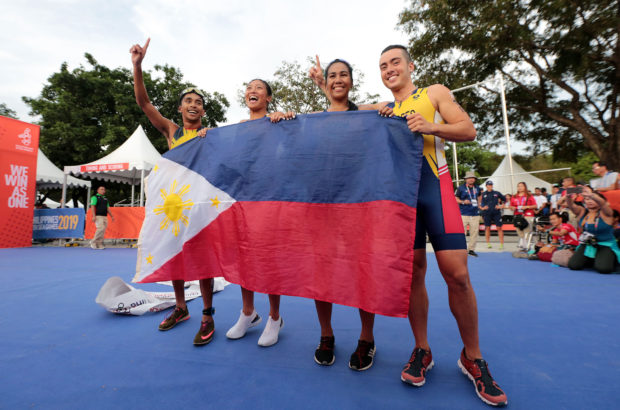Who is Fernando Casares and why is he in the company of the bemedalled triathletes?

Fernando Casares (right) joins (from left) John Leerams Chicano, Kim Mangrobang and Claire Adorna in celebration after they ruled the mixed relay event. –GRIG C. MONTEGRANDE
SUBIC BAY FREEPORT – Four golds and three silvers.
That’s the combined total of medals that the four-man Philippine relay team had won in this and previous editions of the Southeast Asian Games before seeing action in the final event of triathlon competitions on Monday.
None of those medals belonged to Fernando Casares.
Until last Monday, very few people, even in the local triathlon community, knew who Casares was. They call him Fer, but not even the country’s top triathlon official knew his full first name was Fernando. But on the very last day of triathlon competitions, Casares made a name for himself.
He became part of the gold-medal winning team that completed the Philippine sweep of all gold medals in the 30th SEA Games.
Before Monday’s final race, John “Rambo’’ Chicano, Kim Mangrobang and Claire Adorna had won a total of four golds and three silvers in the past three editions of the SEA Games.
The rookie Casares stood out like a sore thumb in the quartet. But that was until he took over from the leadoff leg of Mangrobang and plunged into a sprint triathlon (each athlete swam 340 meters, biked 6.6 kms and ran 1.8 kms). He widened Mangrobang’s advantage before passing off to Adorna and Chicano took over and ran an extra 200 meters to the finish. The opposition never had a chance. Singapore finished second and Indonesia came in third.
How Casares got to be in the illustrious company of bemedaled triathletes like Chicano, Mangrobang and Adorna is a story that started two years ago halfway around the globe.
Casares, a Spanish-Filipino, had been under the radar until last year. He was just an age-grouper doing sprint triathlons in Spain, fresh out of college. He was aspiring to become an elementary school teacher when he encountered a group of elite Filipino triathletes going to a training camp in Portugal.
He introduced himself and expressed interest in joining the team and competing for the country of his mother, who is from Bulacan. ‘’My mother is Pinay,’’ he said proudly.
The Madrid-born Casares, of course, needed to prove his worth, so he came over to Manila last January to do just that. He sought out his mother’s relatives in Bulacan and Laguna. (They came in full force last Monday to cheer him on).
What Coach Ani de Leon and officials of the Triathlon Association of the Philippines saw impressed them enough to allow him to try out.
He was not at his best in his local debut in the Subic International Triathlon (he finished fourth among Filipinos) in April, but he was impressive in the Gyeongju, Korea, Asian Championship triathlon in June, finishing third, not too far behind Kim Remolino and Chicano, among the Filipinos.
That convinced triathlon coaches and officials to take him in two the national pool.
De Leon said the 23-year old Casares is very strong in all three disciplines, but he is strongest as a biker.
And to think that he doesn’t even have a decent bike like the other elite triathletes, who have their own sponsors, De Leon said.
Casares now stays with Ani and her husband, coach Dan Brown, in Nuvali where he trains with the couple’s wards. It is also the training ground of another national team member, 30th SEA Games women’s silver medalist Kim Kilgroe.
De Leon believes in the potential of Casares. “He’s a fast swimmer and runner, but he is at his best on the bike,’’ she said.
Kevin Eijansantos, a former national team triathlete and now a member of the coaching staff, said Casares is now very close to the level of the country’s top campaigners, Remolino and Chicano.
